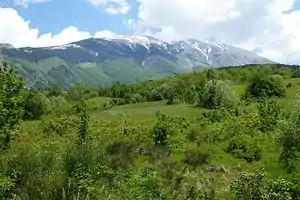Maiella National Park
Maiella National Park (Italian: Parco Nazionale della Majella) is a national park located in the provinces of Chieti, Pescara and L'Aquila, in the region Abruzzo, Italy.
| Parco Nazionale della Majella | |
|---|---|
IUCN category II (national park) | |
 Majella Massif | |
 Maiella Location of the park | |
| Location | Abruzzo |
| Nearest city | Sulmona |
| Coordinates | 42°4′55″N 14°3′36″E |
| Area | 628.38 km2 (242.62 sq mi) |
| Established | 1991 |
| Governing body | Ministero dell'Ambiente |
| www | |
It is centered on the Maiella massif, of which Monte Amaro is highest peak at 2,793 m (9,163 ft) elevation.
The 740.95 km2 (286.08 sq mi) large area of Maiella National Park, especially the Montagna della Majella, has been subject to a major international geoscientific research Project, TaskForceMajella from 1998 up to 2005. Along the northern slope of the mountain for thousands of years hydrocarbon extraction has occurred from spontaneous seepages and shallow wells.[1]
Main sights
The park contains about 500 kilometres of hiking trails through the mountains, cave paintings in Grotta Sant'Angelo and Grotta del Cavallone (the latter being one of the deepest caves in Europe open to the public).
Tourist centers located in the park include:
- Maurizio Locati Visitor Center, Colle Madonna, Lama dei Peligni - sections dedicated to chamois, archeology, a reconstruction of a Neolithic village, and the Giardino Botanico Michele Tenore.
- Museo Naturalistico at Fara San Martino.
- Paolo Barrasso Visitor Center at Caramanico Terme. It houses geology sections including fossils discovered on the Majella Mountain, and archaeologic findings from the Upper Paleolithic to the Roman age.
- Giardino Botanico Daniela Brescia at Sant'Eufemia a Maiella -
Wildlife

Due to its altitude, inaccessibility and prominence most of the park's territories are uninhabited and so the human-made structures, including skiing resorts and roads, are fewer than those in other national parks of Italy. This condition favored the apennine wildlife which is shown here in all its greatness. The most representative animal of the Majella territories is the Italian wolf which is also present in the park's logo and it relies on a population of 100 estimated wolves distributed in eleven packs across the main mountain ranges of the protected area. GPS-collars are applied to 17 wolves for ongoing monitoring. It is believed that the wolf population density of the Majella national park is one of the highest in Italy and in the world even if compared to Yellowstone national park.
Notable also the presence of species of the following animals:
- In the high slopes the Abruzzo chamois (Rupicapra pyrenaica ornata) which has been reintroduced, after decades of absence, during 1991 thanks to a repopulation program carried up by the Abruzzo national park authorities;
- The Marsican brown bear (Ursus arctos marsicanus) is regularly present in the national park's beech forests and neighbouring areas, with estimated 20 individuals, representing one of the biggest concentration of bears in one protected area of Central Italy;
- The Golden eagle, with six breeding couples;
- The red and roe deer which have also been reintroduced in the park after the WWII, when they were extinct throughout the Central Apennines.
The amphibians and reptiles that live in this mountainous landscape are the spectacled salamander, the yellow-billed toad and the unique Orsini's viper.
Also goshawk, buzzard, rock partridge, alpine and red-billed chough, peregrine falcon and sparrow hawk are some important bird species that breed inside the park.
Finally other mammals that thrive in the dense forests that surround the majella massif are the wild boar, the Corsican hare, the European pine marten, the European wildcat, the red fox, the European badger and the rare European otter.
References
- van Dijk, J.P. (2019); The 7000 Years Long Journey of the Majella Oil Men - The Fascinating Story of Central Italian Hydrocarbon Exploitation and Earth Sciences in the Val Pescara and the Montagna della Majella. 282 pp. ISBN 978-1077215139 ASIN 1077215134 https://www.researchgate.net/publication/334290729_The_7000_Years_Long_Journey_of_the_Majella_Oil_Men_-_The_Fascinating_Story_of_Central_Italian_Hydrocarbon_Exploitation_and_Earth_Sciences_in_the_Val_Pescara_and_the_Montagna_della_Majella
External links
